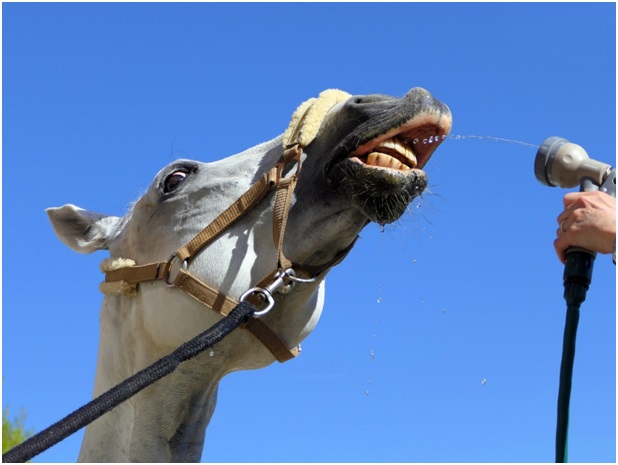How to Keep Horses Cool During the Summer
Jun 4th 2019
 Now that the weather is warming up, it's time to share some tips on how to keep your horse cool during hot weather conditions.
Now that the weather is warming up, it's time to share some tips on how to keep your horse cool during hot weather conditions.
Many riders are surprised to learn that their horse can lose around 4 gallons of sweat every hour, when working hard in hot conditions. Like humans, horses rely on sweating as a means of cooling their body temperature – a cooling effect is created as sweat evaporates from the skin's surface. However, this cooling effect is substantially reduced in high humidity conditions because the sweat has a harder time evaporating from the skin. Less cooling can result in horses becoming more susceptible to heat stress, heat stroke, and dehydration related issues such as muscle spasms and colic. That said, it's of utmost importance for riders and trainers to understand how and when to cool off their horses, be it on the track or during training.
Hydration is key.
After a race, performance horses – particularly ones receiving the diuretic furosemide (Lasix) – are faced with excessive internal heat and severe dehydration. Since heat and dehydration can negatively impact muscles, nerve functioning, and blood flow, it's critical for riders to keep their horses thoroughly hydrated to compensate for profuse sweating during races. Make it a standard to provide your horse with unlimited access to clean, cool water (45° - 64°F) after strenuous activity.
A myth circulated the thoroughbred racing community that drinking an entire bucket of water too quickly after a race could rupture a horse’s stomach. However, this is a false belief given that ingested water begins passing through the gastrointestinal tract almost immediately. Horses also experience an increased respiratory rate after a race, which limits the amount of water they intake since they are forced to take time to catch their breath. This means it's nearly impossible for a horse's stomach to rupture from water intake.
Cool down.
Don’t use a cooling blanket. Blankets and cool-out sheets trap heat and exacerbate the problem. To cool your horse, simply apply cool water continuously over as much of the body as possible until breathing shows recovery.
Know when to call for help.
Call your veterinarian right away if your horse shows warning signs of being overheated: no sweating, increased respiratory rate (above 50 breaths per minute), increased rectal temperature (above 102 degrees Fahrenheit), muscle stiffness or lethargy.
Helping your horse recover from strenuous activity is an involved process, but every measure taken impacts their safety. As the respiratory system is an important way for a horse to control temperature, FLAIR® Equine Nasal Strips play a key role in your horse’s recovery process. Making breathing easier by reducing airway resistance when horses are blowing following intense exercise optimizes recovery and uses less energy to help cool out faster.





